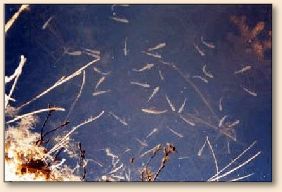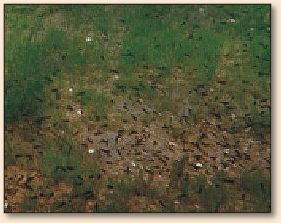
| ||
|
April 13th, 2009
|
|
Some of the "wise guys" say that post-spawn fishing is the
toughest time of the year to catch bass and bluegill. Well,
clearly these guys have never stood on the edge of a pond
in August with rivers of sweat pouring off your moustache
and huge mosquitoes trying to carry you off while you are
attempting to coax a wary bluegill from its summertime lethargy.
But, according to the smart thinkers, after the spawn (65-70
water) all the larger fish migrate to deeper waters and rest.
This is only partly true. Never forget that there are know-it-all
folks who tell fishers what's what, there are swallow-anything
folks who believe whatever they are told, and then there are
folks who pay attention to what's really going on.
"I hear dat," Boudreaux said, "but there's one thing with more dangerous side effects than any of that" Boudreaux said. "What?" the dietician asked. "Wedding cake." For the first week or so after the eggs hatch, bass and bluegill fry are protected on the nest by the male parent. At the end of the week, he leaves and the fry must fend.
But there is good news. Many large bluegill will have retreated to deeper waters and can be caught there. Now the bad news. Fly fishing in deep water requires that (1) you know where the fish congregate (somehow you have to locate structure, humps, drop offs, etc.) and (2) that you have the proper equipment to get deep enough. When you consider that Scientific Angler's advertises that their "full sink" line will sink at
 1.75 - 2.75 inches per second (that's inches, not feet) and is designed for depths from three to six feet, getting deep enough is a real problem. Even if you have the patience of Job, getting a light fly down to a fish at 6 feet with full sink line is going to take you a minimum of 26 seconds. It's a good way to get drunk. (Cast, open a beer, drink some beer, hum a favorite tune, drink some more beer, retrieve, repeat.) You can also try your usual floating line with a long leader (12+ feet) using weighted flies or lead shot on your fly line. This will actually get your fly deeper faster but makes casting somewhat interesting and will result in a bow in the line below the water level (affecting sensitivity). Alternatively, you can fish larger flies in the shallows, slowly. Opportunistic feeders are not adverse to taking a larger meal over the thousands of fry required to make a good meal. An attractive pattern placed in the proximity (that means very close) of a predator may get some attention if it is worked tantalizingly slow. A large bluegill who knows fry are available isn't likely to go beyond his hiding space to chase down even a good looking fly, so every potential fish holding area must be worked carefully. It's not really very different from how a pond should be fished other times, but when you see the water boiling with fry, it requires a lot more patience to divert a predator's attention. It is not recommended, but if you want to fish a fry ball, a mercury midge (black plastic bead head with iridescent body) is a good choice. Unfortunately, while a predator may not shy away from tippet materials, fry will, often leaving your offering alone. Using a #20 fly on anything larger than 6X is difficult anyway because the eye of the hook is so small and the fly is so small that line with any significant diameter will overpower it and make it work stiffly in the water. Which means you have two new problems: trying to set the hook with tiny tippet, and trying to play a decent fish on tiny tippet. As for hook setting, forget it. Your only hope is that the small diameter of the #20 will provide enough hook penetration potential that a small tug will be sufficient. As for fighting the fish, be prepared for a drag-free battle, making sure you don't have too much pressure if a bass makes a head shaking jump.
 P.S. The fry ball phenomenon only lasts about two weeks due to predation. After that the "you just thought things were bad" real summer period arrives, which is the subject of another article. ~ Bob
|
|
Previous Bob Boese Columns If you would like to comment on this or any other article please feel free to post your views on the FAOL Bulletin Board! 
|
 If you heard someone say "fry ball" you probably think of food.
In Louisiana we fry a lot of "balls" – gar balls, boudin balls,
choupique balls, mackerel and kingfish balls, dough balls
(aka fried dumplings), and corn balls (aka hush puppies).
When bass and large bluegill think of a fry ball, they also
think of food.
If you heard someone say "fry ball" you probably think of food.
In Louisiana we fry a lot of "balls" – gar balls, boudin balls,
choupique balls, mackerel and kingfish balls, dough balls
(aka fried dumplings), and corn balls (aka hush puppies).
When bass and large bluegill think of a fry ball, they also
think of food. Boudreaux moved into a new house and invited his
neighbors for his famous chicken-sausage a gumbo. As
side courses he served potato salad, gar balls, boudin and
hush puppies. The neighbor's wife was a dietician who
started to rant to other guests about the menu. "This meal
enough to kill all of us just sitting here. Most of this food
will ruin your internal systems. Mayonnaise is full of vein
clogging fat. The cholesterol in meat will just stop your heart.
Herbicides have poisoned all our vegetables. Fish are filled
with toxins."
Boudreaux moved into a new house and invited his
neighbors for his famous chicken-sausage a gumbo. As
side courses he served potato salad, gar balls, boudin and
hush puppies. The neighbor's wife was a dietician who
started to rant to other guests about the menu. "This meal
enough to kill all of us just sitting here. Most of this food
will ruin your internal systems. Mayonnaise is full of vein
clogging fat. The cholesterol in meat will just stop your heart.
Herbicides have poisoned all our vegetables. Fish are filled
with toxins." Bluegill fry are so small that they can only be replicated by midge-sized
fly patterns. Unfortunately, while trying to hook a bass or large bluegill
on a #20 hook is possible, it is not a likely scenario, and unless a fry
ball is found to cast into, predators won't bite a lone fry fly because
they generally don't bother spending energy on such a small snack.
Like kids grabbing a couple of M&Ms as they pass by the candy b
owl, lone fry are an eaten due to proximity, not because they were
hunted down.
Bluegill fry are so small that they can only be replicated by midge-sized
fly patterns. Unfortunately, while trying to hook a bass or large bluegill
on a #20 hook is possible, it is not a likely scenario, and unless a fry
ball is found to cast into, predators won't bite a lone fry fly because
they generally don't bother spending energy on such a small snack.
Like kids grabbing a couple of M&Ms as they pass by the candy b
owl, lone fry are an eaten due to proximity, not because they were
hunted down.